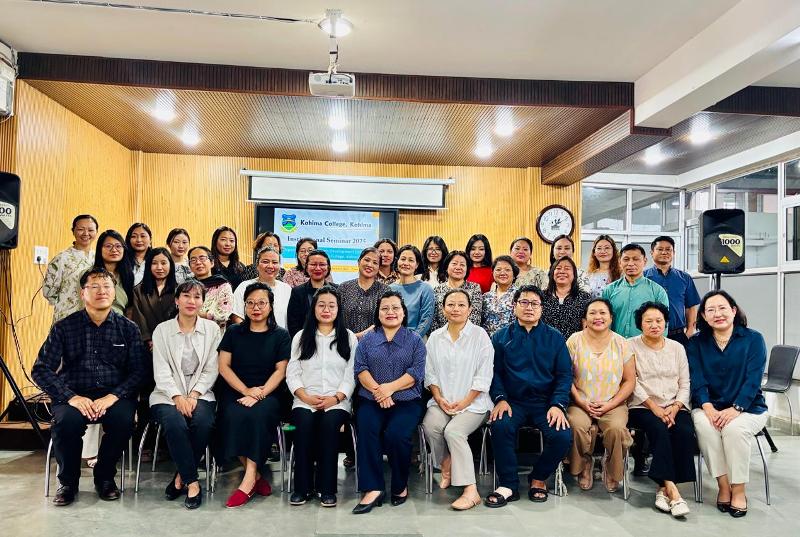THURSDAY, JULY 31, 2025
- Home
- Eco-feminism to digital behaviour, Kohima College seminar explores diverse themes
Eco-feminism to digital behaviour, Kohima College seminar explores diverse themes
The research and development cell of Kohima College, Kohima, conducted its ‘Institutional Seminar 2025’ at the college conference hall on June 21.
Published on Jun 22, 2025
By EMN
Share

DIMAPUR — The research and development cell of Kohima College, Kohima (KCK), conducted its ‘Institutional Seminar 2025’ at the college conference hall on June 21.
The seminar brought together faculty researchers from various departments who presented papers on diverse themes ranging from ecofeminism to traditional architecture, digital behaviour, political identity, and indigenous languages, the college stated in an update.
Dr. Eunice Alinger, Assoc. Prof. From Dept. of History, in her opening remarks, highlighted the increasing importance of research and academic publications in the academic ecosystem, underlining how such platforms help strengthen knowledge, innovation, and scholarly collaboration within institutions.
The first paper was jointly presented by Dr. Limayangla Pongener and Diezenuo Tase, Asst. Profs.. the Department of English. Their paper, titled ‘Eco-feminism in folklore about nature, foraging and agriculture among the Angami women of Kohima village,’ explored the intersection of ecology, gender, and justice.
Drawing from folklore, myth, and lived experiences, the presentation aimed to critique patriarchal and capitalist systems while promoting sustainability, equity, and cultural heritage through literature and storytelling.
Also read: Kohima Press Club marks silver jubilee with conservation workshop
The second presentation was delivered by Megosie-ü Khate, a member of the Minor Project Team A, funded by the Department of Higher Education. Her paper, titled ‘Traditional Angami architecture: A study of change and continuity,’ examined the architectural heritage of the Angami Nagas.
The study aimed to identify, document, and understand the significance and functionality of traditional structures, the driving forces behind architectural changes, and the resulting impact on contemporary Angami communities. Dr. Evothung Ezung, Assoc. Prof., Department of Economics and Principal Investigator of Minor Project Team B (also funded by the Department of Higher Education), presented a paper on ‘The impact of social media on the academic performance, mental health, and social behaviour of college students in Nagaland.’
The study revealed the double-edged nature of social media—while it serves as a useful academic resource and a tool for connectivity, it also poses challenges such as distraction, addiction, and adverse mental health effects among students.
Aosangla Longkumer, Asst. Prof., Dept. of Sociology, presented a research paper titled ‘Voting behaviour of undergraduate students in students’ election: An interdisciplinary case study of Kohima district 2024–2025.’
“This paper was part of an inter-departmental project and delved into the complex nature of student voting behaviour. It revealed how personal values, peer networks, and socio-political identities shape students’ engagement in electoral processes and stressed the importance of connecting democratic ideals to students’ lived realities within academic institutions,” the update stated.
Mhasivilie Zhale, Assoc. Prof., Dept. of Tenyidie, in his paper ‘Popular idioms related to hunting of wild animals and birds in Tenyidie,’ highlighted the richness of the Tenyidie language through vivid hunting-related idiomatic expressions.
Zhale explained how the usage of such idioms reflects wisdom, sharpens communication, and reinforces cultural identity.
Lona Katiry, Asst. Prof., Department of Education, presented a thought-provoking paper titled ‘Understanding work-life balance and the influence of hobbies as an important component.’ Her research underlined the positive influence of hobbies on mental well-being, stress reduction, social interaction, and personal development, encouraging individuals to view hobbies as essential to holistic living rather than mere pastimes.
Dr. Ketoukhrieü, Asst. Prof.,Dept. of Political Science, wrapped up the day's presentations with her paper ‘The politics of recognition: A brief political history of identity assertion among the Tikhir Nagas.’
Ketoukhrieü’s paper, drawn from her ongoing ICSSR major research project titled ‘Living at the periphery: Territory, culture and identity of the Tikhir Nagas, a scheduled tribe in Nagaland near the Indo- Myanmar Border,’ investigated the assertion of a distinct tribal identity.
“The 2025 Institutional Seminar at Kohima College stood out as a dynamic platform fostering academic exchange, interdisciplinary research, and the celebration of indigenous wisdom.
Each presentation not only contributed to knowledge building but also highlighted the rich socio-cultural landscape of Nagaland, demonstrating the college’s commitment to both global academic standards and local relevance,” the update added.

